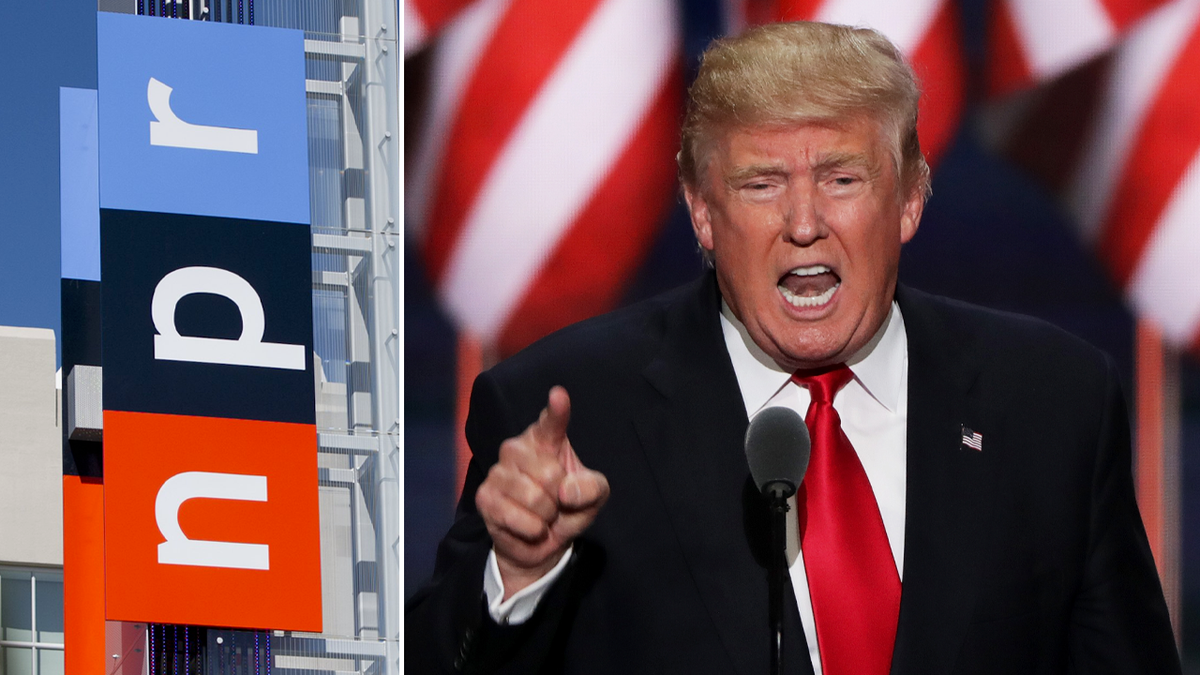Why Trump stripped NPR of federal funding and what happens next
NEWYou can now listen to Fox News articles!
NPR was long lambasted by President Donald Trump and other Republicans as a left-leaning institution that didn’t deserve taxpayer money, but after years of banter, federal funding was cut last week.
Trump’s rescissions package includes over $1 billion in cuts from the Corporation for Public Broadcasting (CPB), the government-backed funding arm for NPR and PBS. The clawback package teed up cuts to “woke” spending on foreign aid programs and public media, as Republicans finally yanked federal money from NPR in a move advocates said was long overdue.
Fox News Digital breaks down exactly what happened — from attention to NPR’s perceived liberal bias through Trump’s rescissions package, and what happens next.
RURAL NPR STATIONS ‘DISAPPOINTED,’ DETERMINED TO SURVIVE AFTER RESCISSION PACKAGE ELIMINATES FEDERAL FUNDING
NPR was long lambasted by President Donald Trump and other Republicans as a left-leaning institution that didn’t deserve taxpayer money, but after years of banter, federal funding was cut last week. (NPR logo by SAUL LOEB/AFP via Getty Images. Trump photo by Alex Wong/Getty Images)
- Longtime editor Uri Berliner spoke out about the public radio outlet in 2024 with a Free Press essay, detailing the “absence of viewpoint diversity” at the organization he worked for.
- Berliner criticized NPR’s coverage of Russiagate, the COVID lab leak theory and Hunter Biden’s scandalous laptop, among other issues.
- Berliner also said voter registration records in 2021 showed an astonishing disparity between Democrats and Republicans in the NPR newsroom as recently: 87 to zero.
- Berliner was suspended without pay and NPR told him it was a “final warning” and he would be shown the door if he violated NPR’s policy about working with outside news organizations going forward. Instead, Berliner resigned.
- Once Trump returned to the White House, stripping public media of federal funding began to emerge as a realistic possibility.
- DOGE Subcommittee Chair Rep. Marjorie Taylor Greene, R-Ga., invited NPR CEO Katherine Maher and PBS News CEO Paula Kerger to testify about what Greene called their “blatantly ideological and partisan coverage” amid a debate over public funding.
- In her opening remarks, Maher said NPR plays an essential role in “delivering unbiased, nonpartisan, fact-based reporting” to Americans and NPR is the only “non-paywalled” news outlet with a reporter dedicated to covering veterans’ issues.
- Rep. James Comer, R-Ky., said, “I feel like it’s propaganda. I feel like there’s disinformation every time I listen to NPR.”
- During the hearing, Maher also expressed regret about remarks she made about Trump before she ran the outlet.
- The New York Post’s bombshell reporting on the laptop was released in the heat of the 2020 election where then-Democratic nominee Joe Biden faced off against President Donald Trump. The story shed light on Hunter Biden’s overseas business practices and his father’s possible involvement, and the laptop also had shocking videos and photos of drug use and lewd acts.
- At the time, NPR public editor Kelly McBride addressed a listener’s question about the news outlet’s blackout of coverage. She said the Post’s reporting had “many, many red flags.”
- “We don’t want to waste our time on stories that are not really stories, and we don’t want to waste the listeners’ and readers’ time on stories that are just pure distractions,” NPR managing editor Terence Samuel told McBride. “And quite frankly, that’s where we ended up, this was … a politically driven event, and we decided to treat it that way.”
- Maher conceded during her congressional testimony in March that her organization missed the mark in its lack of serious coverage of the Hunter Biden laptop story. “I do want to say that NPR acknowledges we were mistaken in failing to cover the Hunter Biden laptop story more aggressively and sooner,” Maher told Rep. Michael Cloud, R-Texas.
- Trump said he “would love to” remove federal funding outlets NPR and PBS during a meeting at the White House in late March.
- “It’s been very biased. The whole group, I mean, a whole group of them. And frankly, there’s plenty of — look at all the media you have right now. There’s plenty of coverage,” Trump told reporters. “They spend more money than any other network of its type ever conceived, so the kind of money that’s being wasted, and it’s a very biased view, you know that better than anybody,” Trump continued. “And I’d be honored to see it end.”
- Though Trump and other conservative critics have long accused NPR of being politically biased towards Democrats, Maher insisted that they “serve all Americans” and seemed to deny any bias, saying, “We believe that, as a public broadcaster, we do have an obligation to serve all Americans, and we need to make sure that our coverage reflects the interests and perspective. And we hear from Americans across the political spectrum. That‘s important to us, and we want to make sure we live up to that.”
- NPR media correspondent David Folkenflik posted on X that Maher and the NPR corporate team were addressing staffers on the heels of Senate Republicans passing the clawback package.
- “We are going to go through a tremendous amount of change,” Maher said, according to NPR’s media correspondent.
- Congress officially sent a package detailing $9 billion in spending cuts to Trump’s desk after the House of Representatives passed the bill in a late-night vote last week.
- The bill, called a “rescissions package,” was approved by the House of Representatives in a 216 to 213 vote after intense debate between Republicans and Democrats. Just two Republicans, Reps. Brian Fitzpatrick, R-Pa., and Mike Turner, R-Ohio, voted in opposition.
- Republicans celebrated it as a victory for cutting off the flow of U.S. taxpayer dollars to what they called “woke” initiatives.
- Tami Graham is the executive director of KSUT, an NPR member station located in the southwestern corner of Colorado that serves the rural Four Corners region. On October 1, KSUT will lose nearly 20% of its budget because of the rescission bill. “It’s a pretty immediate turnaround we’re having to do to try to fundraise so that we don’t have to cut critical staff, programming, local news, et cetera. Those are the kind of decisions we’re facing down right now,” Graham told Fox News Digital.
- Shawn Turner, who serves as WKAR Public Media general manager and also sits on NPR’s Board of Directors, oversees the member station that serves eight counties across mid-Michigan that include several “news deserts.” “The loss of federal funding will significantly impact our ability to have our reporters get out to those communities, go to community meetings, talk to people in those communities, go to events to be able to report on what’s happening in those communities,” Turner told Fox News Digital.Turner explained that some of the services WKAR provides, such as a radio reading service for the visually impaired and educational services, will be reduced but will remain in some capacity for as long as possible.
- Turner explained that some of the services WKAR provides, such as a radio reading service for the visually impaired and educational services, will be reduced but will remain in some capacity for as long as possible.
- Maher expressed “deep frustration” upon the passage of the Trump administration’s rescissions package, but she vowed NPR would continue to operate.
- “Throughout this process, the political rhetoric has been about punishing NPR (and PBS) for editorial and programming decisions. But the reality is that NPR receives less than half of one percent of all federal funds for public broadcasting. More than 70% goes directly to local stations,” Maher told Status.
- “I expect you’ll see nearly immediate loss of universal coverage in hard-to-reach parts of the country, as well as layoffs of journalists covering local and state news,” Maher added.
- Maher said NPR would “take a moment to mourn” and ultimately move forward.
CLICK HERE TO GET THE FOX NEWS APP
Fox News Digital’s Joseph A. Wulfsohn, Elizabeth Elkind, Hanna Panreck and Lindsay Kornick contributed to this report.
Brian Flood is a media editor/reporter for FOX News Digital. Story tips can be sent to [email protected] and on Twitter: @briansflood.





